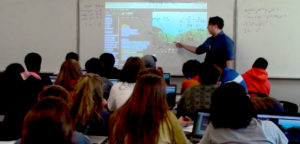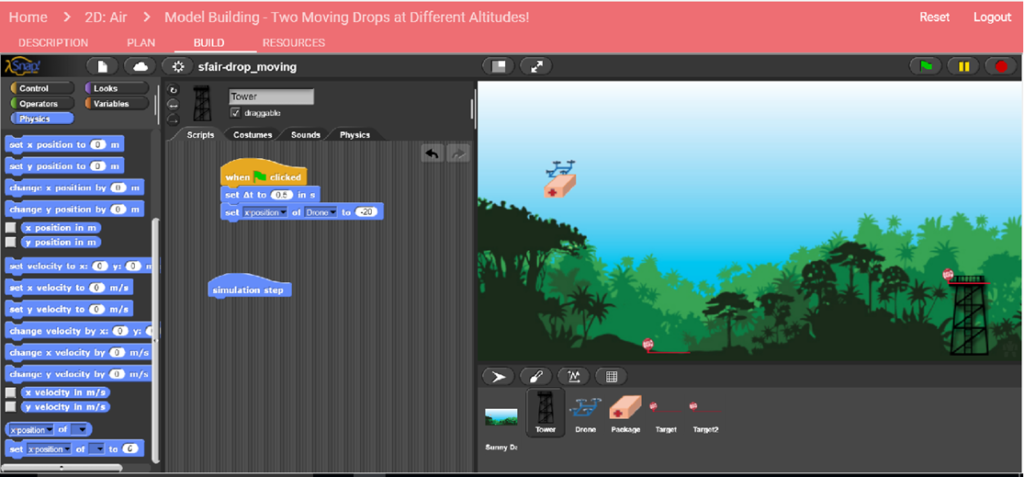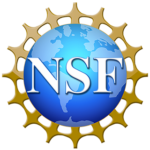C2STEM
Overview:
C2STEM is a multi-institutional project to design and develop a Collaborative, Computational STEM (C2STEM) learning environment that is based on a novel computational paradigm that combines visual programming with the concept of domain specific modeling languages to promote discipline-specific (e.g., Physics, Economics) computational modeling, while promoting synergistic learning of discipline-specific and CS (CT) concepts and practices. To assess synergistic student learning, a second research component of our work introduces a principled evidence-centered design (ECD) approach to developing STEM and CS assessments that align our approach and accompanying curriculum with the NRC Science Framework and CT concepts and practices that are informed by AP CS Principles and the new K-12 CS framework (k12cs.org). A third research component brings in a novel Preparation for Future Learning (PFL) approach to assessing learning by modeling by examining students’ ability and propensity to apply computational constructs and CT practices while learning new STEM topics and working on a new set of problems.
 In particular, our research focuses on developing Physics, Marine Biology, and Earth Science curriculum tasks to support student learning by building computational models of science processes and then applying the models to problem solving tasks. Our research on learning, problem solving, and assessment in STEM and computing goes beyond the relatively narrow curricular goals and preparation for standardized tests. Instead, we focus on a learning process motivated and driven by computational modeling of science processes that are linked to the real-world, and a computing approach that focuses on algorithm design and CT concepts and practices that support model building and problem solving.
In particular, our research focuses on developing Physics, Marine Biology, and Earth Science curriculum tasks to support student learning by building computational models of science processes and then applying the models to problem solving tasks. Our research on learning, problem solving, and assessment in STEM and computing goes beyond the relatively narrow curricular goals and preparation for standardized tests. Instead, we focus on a learning process motivated and driven by computational modeling of science processes that are linked to the real-world, and a computing approach that focuses on algorithm design and CT concepts and practices that support model building and problem solving.
Download Our Flyer for Additional Information!
Goals:
In keeping with this goal for synergistic learning of STEM and CT with accompanying ECD-based and PFL assessments, we are addressing the following research questions:
- RQ1. Synergistic Learning and Problem Solving. Does the learning by modeling framework grounded in visual Domain Specific Modeling Language (DSML) constructs implemented in the C2STEM system along with the accompanying curricular units lead to a deeper synergistic learning of both STEM and CS (CT) concepts and to better problem solving abilities in STEM domains?
- RQ2. Evidence Centered Design for Assessments. How can content and practices for science and CT for high school be organized into a structured assessment framework and used to generate evidence of learning in the context of evaluating a curricular innovation? How can views of scientific modeling (as articulated in the Science Framework) inform the design of curriculum and assessment of computational modeling (as articulated in CS Frameworks), and vice versa?
- RQ3. Preparation for Future Learning Assessments. Does learning CT through creating scientific models and simulations increase the likelihood that students will appropriately apply CT principles when approaching new science content, will it influence the learning of the new content, and how can this influence be measured?

Learn more about C2STEM and demo our curriculum tasks!
Research Team:
Vanderbilt: Gautam Biswas, PhD, Akos Ledeczi, PhD, Nicole Hutchins, Caitlin Snyder, Naveed Mohammed
SRI: Kevin McElhaney, PhD, Satabdi Basu, PhD, Christopher Harris, PhD, Carol Tate, Reina Fujii
Independent Researcher: Shuchi Grover, PhD
Salem State: Luke Conlin, PhD
Stanford: Dan Schwartz, PhD, Kristen Pilner, PhD, Doris Chin, PhD, Rachel Wolf, PhD
Evaluator:
ETR: Shannon Campe
Funding agency:


